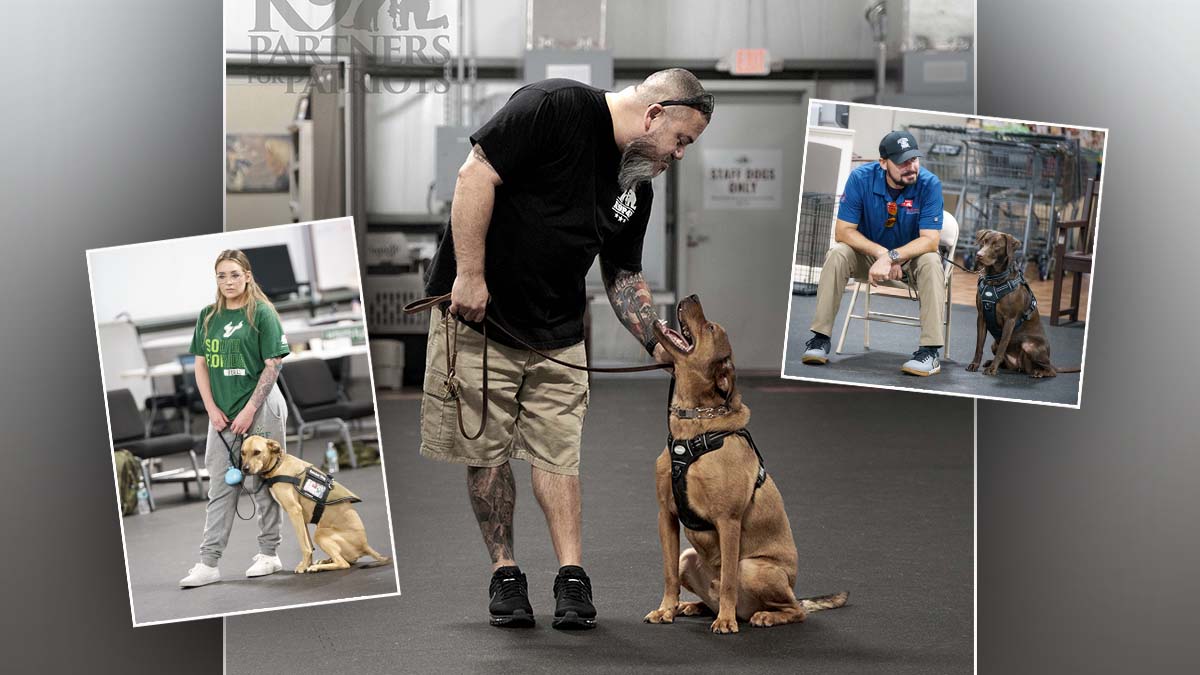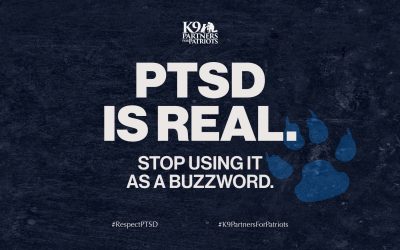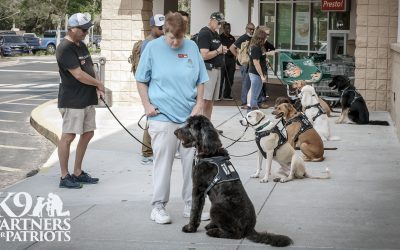Introduction
For many veterans, life after service comes with invisible scars. Post-Traumatic Stress Disorder (PTSD) can make everyday life overwhelming, affecting sleep, relationships, and the ability to feel safe in the world. Nightmares, flashbacks, anxiety, and hypervigilance become constant companions — ones that few outsiders truly understand.
But there is hope. Service dogs are changing lives by providing veterans with essential support, both physically and emotionally. These highly trained rescue dogs do more than offer comfort — they perform specific tasks that help veterans manage symptoms and reclaim independence.
(Learn more about our mission on the cornerstone page → Service Dogs for Veterans with PTSD.)
Understanding PTSD Symptoms in Veterans
PTSD is a serious condition that develops after experiencing or witnessing trauma. Among veterans, the condition is especially common, with many living daily with its effects.
Some of the most common symptoms include:
- Nightmares and night terrors that rob veterans of sleep.
- Flashbacks that bring traumatic moments back to life in vivid detail.
- Hypervigilance, the constant feeling of being on guard or in danger.
- Avoidance behaviors, such as isolating from people, places, or situations that trigger fear.
- Anxiety and panic attacks that appear without warning.
These symptoms don’t just affect mental health — they take a toll on relationships, careers, and overall quality of life.
How Service Dogs Provide Grounding During Anxiety and Flashbacks
One of the most powerful roles a service dog plays is grounding their veteran in the present.
When a flashback or panic attack occurs, the dog may:
- Nudge or paw their veteran to interrupt spiraling thoughts.
- Apply deep pressure by leaning against them, providing calming sensory input.
- Redirect their focus to a safe and tangible connection — the dog’s touch.
This intervention can stop a flashback from overtaking the moment, helping the veteran reconnect with reality.
Nighttime Support: Interrupting Nightmares
For veterans with PTSD, nights can be as challenging as days. Night terrors are a common and debilitating symptom, leaving veterans exhausted and fearful of sleep.
Service dogs are trained to recognize signs of distress, such as thrashing or rapid breathing. When this happens, the dog gently wakes the veteran, pulling them out of the nightmare cycle.
This not only restores more restful sleep but also reduces the dread of going to bed. Better sleep means stronger mental health and a better chance of healing.
Creating Safety and Space in Public
Crowded environments often trigger intense anxiety for veterans with PTSD. Hypervigilance makes it difficult to relax when people are too close or when exits feel blocked.
- Service dogs can create a safe bubble by:
- Standing behind their veteran (“watching their six”) to reduce fear of surprise.
- Blocking in front or circling to maintain personal space.
- Guiding their veteran calmly through crowds.
With this support, veterans can shop, attend events, and participate in community life — things many avoided before receiving their service dog.
The Bigger Picture — Reclaiming Independence
When symptoms are managed with the help of a service dog, doors begin to reopen. Veterans often report that their dogs give them the confidence to:
- Return to school or the workplace.
- Rebuild relationships with loved ones.
- Travel with greater ease, including navigating airports and TSA checks.
- Enjoy life outside the home without overwhelming fear.
Independence is restored, and with it, a renewed sense of purpose and hope.
Real Stories of Hope
Behind every service dog is a veteran whose life has been forever changed.
- Dan and Bella: After serving in Iraq, Dan struggled with nightmares and hypervigilance. Bella, a rescue dog, was matched with him through K9 Partners for Patriots. Today, Bella wakes him from night terrors and grounds him during moments of anxiety, giving Dan peace he never thought possible.
- Leland and Kayla: Leland once avoided public places entirely. With Kayla by his side, he now navigates daily life with confidence, knowing she will protect his space and provide comfort when he needs it most.
These are just two examples of the hundreds of veterans who have found strength and healing through our program.
[→ Read more Veteran Stories here]
Conclusion: A Lifeline for Veterans with PTSD
Service dogs aren’t just trained animals — they are partners in survival, healing, and hope. For veterans living with PTSD, these dogs provide grounding, safety, reassurance, and independence that transforms their daily lives.
At K9 Partners for Patriots, we rescue dogs from shelters and pair them with veterans in need, creating life-saving partnerships that prevent suicide and restore independence.
👉 Want to learn more about how service dogs support veterans? Visit our cornerstone page → Service Dogs for Veterans with PTSD.
👉 Help us continue this mission. Every donation saves two lives — a veteran and a rescue dog. Donate Today.




